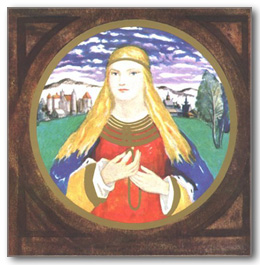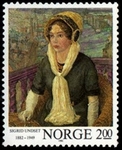About Last Night
- HELEN ALVARE
In shedding its powerful light on the relationship between our sexual selves and the rest of our lives, Sigrid Undset's great novel Kristin Lavransdatter reveals the nature of virtue and inspires us to want to live more virtuous lives.
 |
There are so few books today that matter, that talk about their subject, in light of the divine destiny of every human being. So I might be forgiven for my effusive enthusiasm on discovering what many have called the greatest Catholic novel ever written, Sigrid Undset's Kristin Lavransdatter. Kristin gives you insight into virtue and makes you want to be more virtuous yourself. It makes another signal contribution; it demonstrates no, that's not strong enough it makes you feel the relationship between our sexual selves and the rest of our lives, powerfully, and that is exactly what's needed to challenge current prevailing attitudes, which can be summed as: As long as it's consensual, what I do sexually is nobody's business. Any young woman under my influence will get a copy of Kristin to read the day she turns 16. And every young woman to whom I have recommended Kristin in the past year has reacted to it as if they had discovered a new world.
I say this as one who regularly finds herself at a microphone in front of hundreds of high-school or college-aged Christian women, trying to express the sacred meanings of human sexual intercourse. Go on, dear; you're a young woman; they'll listen to you, say the well-intentioned people who get me there. Ha! The only ones nodding along with me are already wearing JPII World Tour buttons. The rest seem less than enthusiastic.
I tell them sex lies when it doesn't say forever, and that it can only say forever in marriage. I count the casualties for them the sexually transmitted diseases, the abortions, post abortion syndrome, single parenting. I assure them that committed, married love is the best place for human happiness and authentic freedom to flourish. However, before it's all over, at best, I have captured their intellects, but usually not their hearts.
Any wisdom I possess about the profound meaning of a sexual relationship comes predominantly from reflection on experience and from comparing my experience with the experiences of so many I know who have chosen a path outside the sex-only-in-marriage model. You can only go so far in appealing to a future that your audience hasn't yet lived. Reading Kristin is about as close to learning from experience as you can get without the experience. While it is simply impossible to convey its beauty or power in a condensed form, a summary is a necessary preface to a few observations about what Kristin teaches.
Kristin follows the life of a girl from her childhood to her death in 14th century Catholic Norway. Kristin is the daughter of Lavrans Bjorgulfson (thus Lavransdatter). In modern parlance, it would be said that Lavrans walks the talk, or puts his money where his mouth is. He is a well-off husbandman with noble relations. Lavrans is well known for his devotion and generosity to the Church and his charity and justice toward all who deal with him. He has a special love for his daughter Kristin, a strong-minded, strong willed girl who, from her early days, aspires to her father's moral code.
Kristin is eventually betrothed by her father to a man of her father's taste and character ,Simon Andresson, but she falls quickly and vehemently in love with a man who has a long and shameful history of relations with women, Erlend Niklausson. Erlend sees Kristin's goodness, loves it, and believes he can be good for her. In her passion for him, she is willing at first to overlook his worst faults. They have sexual relations before marriage.
Kristin's betrothed, Simon, has such great regard for her father that he arranges to sever their engagement without betraying Kristin to him. After a long and bitter contest of wills between father and daughter, Kristin and Erlend are permitted to wed. She is pregnant at the time.
Through a long marriage, and the birth of eight sons, Kristin and Erlend fight. Kristin repeatedly throws up to Erlend his violation of her virginity and the evil it brought into their married life. She cannot forgive herself or Erlend until near the end of her life. In the end, this hard heartedness drives Erlend to abandon her. After rearing her sons to their adulthood, Kristin then becomes a lay sister with an order of nuns. There she dies, partly as a result of an heroic act of faith and courage.
The first reason to recommend Kristin to young women is its basic, resounding message that sex matters. Kristin explores how our sexual lives affect our relationship with God, parents' relationships with their children, and husbands' with their wives.
|
Sigrid Undset |
||||
She wrote 36 books, the mediaeval novels being one part. Another part are her contemporary novels of Kristiania (now Oslo) and Oslo between the turn of the century and the 1930s, the third part being literary essays and historical articles. Her authorship is wide-ranging and of remarkable depth and substance. None of Sigrid Undset's books leaves the reader unconcerned. She is a great storyteller with a phenomenal knowledge of the labyrinths of the human mind.
|
Kristin's premarital relations with Erlend reverberate throughout her every relationship and throughout her entire life. That Erlend takes her virginity without her full consent poisons the well of their lifelong relationship. Immediately after their first sexual encounter, Kristin feels bound to Erlend in a way that she senses is premature. She feels more helpless, more dependent, more exposed to loss because she is bound but not permanently to him by this sexual act: And since Erlend had wrought her this, she felt herself grown so wholly his, she knew not how she should live away from him anymore. She was to go from him now, but she could not understand that it should be so. This sexual bonding leads her to feel that their life together is inevitable, although the reader can feel immediately that it will be the source of tremendous sorrow for Kristin and her family, and that Kristin, Lavrans, and others know this.
Kristin continues having sexual relations with Erlend before they are married. She senses that his willingness to do this means he has not broken from his former ways, and she is right. Erlend's inability to master himself, his impetuousness, his inability to put honor first, cost himself and Kristin and their children severely throughout their lives.
In other words, our sexual behavior deeply affects our persons, our futures. For some time before they wed, Erlend defies sexual conventions with other women besides Kristin. He puts his own impetuous desires before the good of those he loves, including even the woman he claims to love above all others and the children they bear together. At one point after his marriage to Kristin, Erlend's sexual infidelity is instrumental in his being jailed, and nearly killed, for treason. (A woman with whom he had slept discovered an incriminating document in his clothes.)
Kristin also demonstrates the effects that our sexual behavior can have on the happiness of our relationships with third parties. Kristin's and Erlend's actions diminish her father's esteem for her. Her premarital sexual relations, her premarital pregnancy, affect Lavrans deeply and cause him shame in the eyes of the community, a shame which drives them apart. She feels unforgivable. Reverberations erupt in her father's marriage as well. Kristin's behavior causes it to come to light that Lavrans's wife was not avirgin at the time of their marriage and that their oldest, deceased son may not have been his.
Kristin shows how our sexual behavior is intimately related to the attainment of authentic happiness and freedom over our whole lives. What seems on the surface like an act of personal freedom in today's parlance having sex when you want it, with whom you want it, no matter what others say does not free Kristin. It burdens her. Especially after she and Erlend conceive their first son out of wedlock, Kristin is deeply conscious of her burden, the violation of God's plan for the use of the gift of sex. Her guilt and her repentance are clearly and emotionally conveyed over the course of the book.
Undset's work further shows how relationships defined largely by sexual or romantic aspects are not fundamentally healthy, especially when other important aspects fidelity, kindness, honesty, charity are missing. When Kristin and Erlend isolate themselves from all others, even their children, and allow their romantic and sexual communication to flourish, all seems fine, but when they must negotiate daily life on a farm or decisions about the future of their children, they flounder. Kristin must supply common sense and Christian wisdom for two. Sex, in other words, is powerful, but no replacement for fundamental strengths that a couple needs over time.
Several months ago, I received a postcard in the mail from our nation's chief mass purveyor of sexual consciousness, Planned Parenthood. On the front was a grainy photo of an unmade bed. The words on the front read: ABOUT LAST NIGHT... You have 72 hours to erase last night. On the back was information about what it euphemistically calls morning-after contraception (it's more often abortifacient, really).
Planned Parenthood's message is that sex is a purely physical manipulation of body parts that can have some physical side effects. One of its worst effects, a baby, can be erased. And then the sex is erased, too. In a world where such messages can be given to young women, Kristin Lavransdatter must be given to them as well.
 This is Meaghen Gonzalez, Editor of CERC. I hope you appreciated this piece. We curate these articles especially for believers like you.
This is Meaghen Gonzalez, Editor of CERC. I hope you appreciated this piece. We curate these articles especially for believers like you.
Please show your appreciation by making a $3 donation. CERC is entirely reader supported.

Acknowledgement
Alvare, Helen. About Last Night. Crisis 17, no. 2 (February 1999): 30-31.
Reprinted by permission of the Morley Institute a non-profit education organization. To subscribe to Crisis magazine call 1-800-852-9962.
The Author
Helen Alvare is director of planning and information for the Secretariat for Pro-Life Activities of the National Conference of Catholic Bishops.
Copyright © 1999 Crisis







